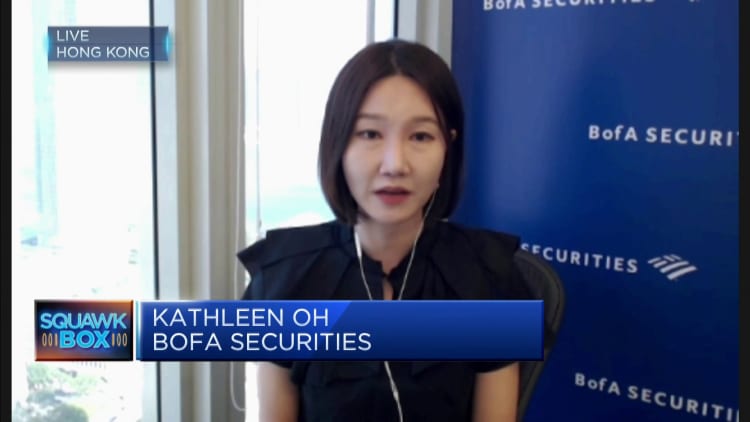Even as the global economy is headed into a recession, South Korea's economy saw a small growth backed by what one analyst attributed to "revenge spending" as the country reopens.
Gross domestic product rose 0.3% for the July-September period, according to Bank of Korea data — the slowest quarterly growth seen in a year. It grew by 0.7% in the previous quarter.
"I think that the momentum domestically is rather resilient," said Kathleen Oh, Bank of America's Korea economist on CNBC's "Squawk Box Asia."
"Consumption is holding up strong with the reopening and pent-up demand in services, we're actually seeing quite strong 'revenge spending' in leisure, entertainment and travel," she said, adding that domestic demand is likely to support continued growth until the rest of this year.
South Korea's third quarter GDP report showed growth was backed mostly by consumer spending and investment in facilities, which grew 1.9% and 5% respectively.
Reopening-boosted pent-up consumer spending slowed while investment showed a more resilient recovery.ING
According to the Korea Culture and Tourism Institute, the total spending for tourism and leisure activities from January to October was about 67 trillion won ($47.2 billion). While it was more than 5% lower than the same period in 2019, before the pandemic, it still saw a more than 21% jump from last year.
Spending dropped more than 28% in 2020 in the same period in 2019 and maintained similar levels in 2021.
"Private consumption maintained an overall robust pace of increase," Goldman Sachs analysts said in a note on Thursday, adding that it was stronger than expected and driven by spending on automobiles and services.
Economists at ING also said, "Reopening-boosted pent-up consumer spending slowed while investment showed a more resilient recovery."
Recessionary pressure in 2023
ING economists expect South Korea to face a recession in 2023.
"Based on the grim outlook for consumption and exports from recently released data, we maintain our view that the economy will experience a moderate recession early next year," they said in a note.

Oh from Bank of America also said she was a lot more bearish on the economy's outlook for next year.
"It's the external demand or the external environment that's been putting pressure overall on the production side or the manufacturing side," she said.
Economists at Goldman Sachs recently downgraded their views for South Korea's growth for 2023 from 1.7% to 1.4%.
"The main reasons for our more bearish growth views are current and prospective weakness in external demand," the economists said in a note.
They pointed toward a potential for spillovers from a global sluggish economy to domestic demand as well as local headwinds including monetary tightening and, in the case of South Korea, fiscal consolidation.

